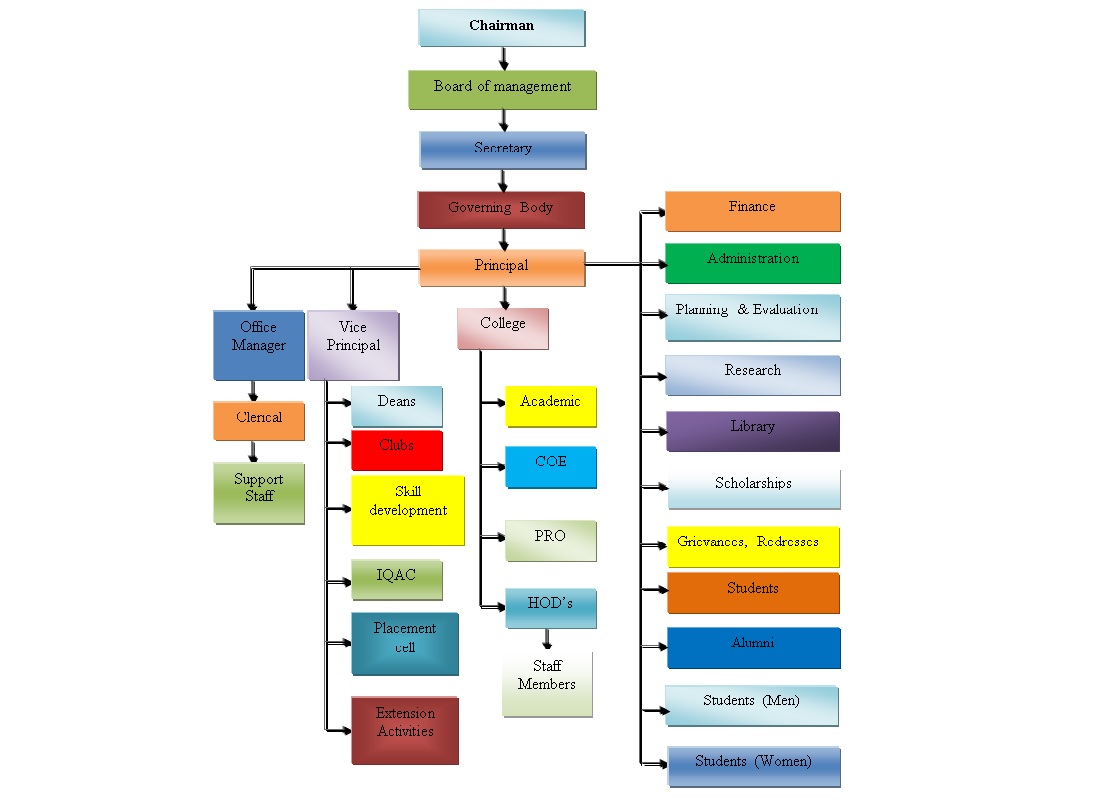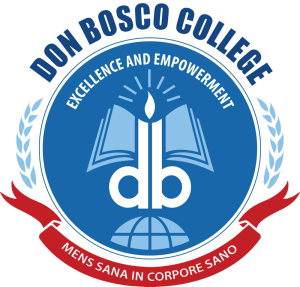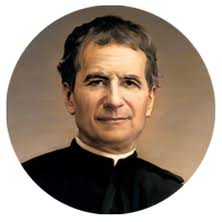
The institution has a highly enlightened and committed management that guides every aspect of educational activity. The highest administrative bodies of the institution are the General Body of South India Salesian Society and the Governing Body of the College.
Don Bosco College, Dharmapuri is a Christian institution, established and administered by the Salesians of Don Bosco. The Provincial of Chennai Province is the Chairman of the Board of Management of the College. The Rector of the local religious community is the Vice-Chairman and Secretary of the College. The Principal and the Vice-Principals are the ex-officio members of the board. The Chairman appoints the other members of the board. All the members of the board are Salesians. The Board of Management is the final decision making body regarding the administration of the institution. This body takes major policy decisions, maintains the quality of the institution and provides the necessary infrastructure to run the institution. With well-defined vision and mission statements, the Board of Management ensures that the purpose, for which the College is established, is safeguarded. It promotes an atmosphere conducive to produce intellectually competent, morally upright, socially committed, spiritually inspired citizens in the service of our country. To achieve this, the Board of Management meets every month, and during certain months more than once, to review the working of the institution and plans for the development of the institution. The Secretary, Principal, Vice-Principal, Administrator, Director of Library as the officers of the institution execute their powers and responsibilities discharging their duties conscientiously every day.
The Rector/ Secretary of the College is the appointing authority of the teaching and non-teaching staff. He is the religious head of the institution and any decisions concerning the governance of the institution rests with him. The Principal and Vice Principal are the heads of the College who execute the academic activities in collaboration with the Heads of the Departments, staff and non- teaching staff and the student community. The Controller of Examination plans the internal Examination schedule and organizes the University Examination in the campus when the schedule is fixed by the University as per university norms. The Administrator of the College acts as a member of the finance committee of the College and maintains the infrastructural facilities of the College and day to day and administration of personnel with the upkeep of the buildings and facilities.
The Vice Principal also carries out the Academic Association activities, Non- Academic Association (Clubs) activities and Sports activities in the campus. Discipline is maintained by the Discipline committee supported by the Vice Principal, Deans, Physical Director and staff representatives. The Additional Vice Principal carries out all University matters for the management, staff and students and acts as a liaison officer with the University and organizes the University Exams along with the Chief Superintendent and the Controller of Examinations of the College. The Heads of the Departments distribute the department workload to the staff and monitor the smooth functioning of the department. They also look after the overall discipline of the department. The College Office Superintendent looks after the day to day office Management, financial transactions and correspondence. A senior staff acts as the Public Relations Officer of the college.
Major Decisions taken by the Management Council from 2007
Meetings of statutory bodies
The College ensures that all positions in its various statutory bodies are filled and meetings are conducted at the stipulated intervals. Apart from mandatory committees like Governing Body, Academic Council and Finance Committee, the Management has constituted many more committees to ensure practice of democratic principles, team work and culture of excellence. Frequent meetings of these committees help in the smooth and effective functioning of the College.
The Role of the Board of Management
Principal’s Role
The Principal is the head of the institution and is the nominee of the Management. He is responsible for the execution of the primary aim of the institution: providing value – based education, in accordance with the curricular, co- and extra-curricular requirements and the directives of the Salesian holistic education as enshrined in the mission statement. The following are the leading responsibilities of the principal:
As the leader of the academic community, he ensures that there exists the necessary climate for intellectual pursuits. He supervises all academic programs of the college and keeps the management informed of all matters of general and financial administration. He represents the College in all academic matters related to the University Grants Commission, the Government, the University and others. The principal oversees the day-to-day administration of the college; in consultation with the Secretary, Vice Principal and departmental heads he plans and executes all academic programs; supervises teaching and non-teaching staff; sanctions co-curricular activities and extension services; coordinates admission of students; oversees student and staff discipline; facilitates the scholarship programme and ensures the smooth conduct of examinations.
He coordinates the members of the staff in such a way as to facilitate teamwork, co-operation and the best results at the service of the mission of the institute. He along with the Vice Principal, facilitates orientation programs and other refresher courses for the staff in order to help them update their knowledge and presentation skills. He fosters synergic relationship with parents and convenes parent-teacher meetings once a year.
The departments are mentored by the Fathers who are in the Board of Management: The Secretary is the academic mentor for the Departments of Computer Science, Digital Print Media and Tamil, The Principal is the academic mentor for the Departments of Physics and Chemistry, The Vice Principal is the academic mentor for the Departments of Mathematics, Commerce, Business Administration and Social Work and The Director of Library is the academic mentor for the Department of English. The Principal along with these department mentors closely guides the departmental activities.
Vice - Principal’s Role
The Vice-Principal is appointed by the Secretary with the consent of the Chairman of the college. He takes the place of the Principal in his absence for the ordinary running of the college. He is in charge of maintaining general discipline of the college. He is in charge of ID cards for students. He monitors together with the Principal the attendance / class regularity of the faculty. He visits the examination halls during internal tests and model examinations. He approves class tours, field trips in consultation with HOD‟s. He coordinates all functions and cultural programmes of the college. He coordinates the activities of associations and the department of games and sports. He identifies the students for scholarships and coordinates the scholarship schemes. He coordinates the organization of bridge courses, spoken English courses and remedial classes. He recommends students for student aid fund and supervises the selection of students for prizes and medals. He scrutinizes and signs public notices and posters on common notice boards. He arranges orientation programme for the first year students in consultation with the dean. He is responsible for the conduct of good morning and good afternoon talks.
Roles of the Heads of Departments
Departments are the basic units of administration in the College. Keeping with the principle of decentralization, the departments manage and plan their academic programme. The head of the department is the key functionary in planning and administering.
The major functions of the head of department are as follows:
To support the principal in the execution of plans and to report to him at least once in a month, on the functioning of the department.
To supervise the functioning of the department and to ensure effectiveness in keeping with the values and vision of DBC.
To set academic goals in consultation with the faculty.
To strive to achieve academic goals and to develop research
programmes in the department with the support of the faculty
To promote appropriate inter-departmental collaboration.
To distribute the work equitably among the faculty and to build up team spirit.
To hold departmental meetings at least once a month and facilitate interaction and sharing among the staff.
To review the course plans and staff journals and to ensure their timely submission to the department mentors and to the Principal/Vice-Principal.
To review the question papers for the internal assessment examinations and to ensure the submission of question papers on time and to assist in proper conduct of examinations.
To ensure the return of the valued Internal Tests and Exams papers to the students within 7 days of the exams and the submission of the marks records to the COE office.
To plan and conduct seminars, workshops, endowment lectures etc., with the involvement of staff and students.
To monitor effective handling of classes by faculty members and to ensure adequate tests programs in the classes.
To take active role in the recruitment of personnel to the department.
To facilitate evaluation of staff members and to provide necessary support.
To ensure the maintenance of records like reports of departmental meetings, functioning of clubs and associations, chronicles etc.
To listen to grievances of students and redress them and report to the management matters those are to be dealt with, at the higher level.
To identify the slow learners and provide them the required help.
To communicate with the parents and report the academic progress to them.
To ensure proper functioning of the Association Activities those are under the respective department.
To organize field trips and industrial visits.
To organize enrichment and add-on courses.
To organize workshops and seminars on curriculum, teaching methods, testing and evaluating with internal or external resource persons.
To grant leave to the students of the respective department, in ordinary cases, up to two days, after discerning the genuineness and urgency of the request.
To submit to the librarian/library committee the list of books to be purchased. To maintain contact with the alumni with the help of the class-in-charge staff.
To head the extension education and Institutional Social Responsibility of the department.
Role of Subject Handling Faculty
To share the Personal Mission Statement with the students at the beginning of the academic year.
To update oneself with the latest knowledge and skills available. To attend at least one Seminar/workshop outside the institution and present a paper every year.
To encourage quality circles in classroom for their respective subjects.
To complete the syllabus according to the course plan prepared at the beginning of the semester.
To discuss with the students the course plans and the methodology adopted in teaching.
To adhere to the university curriculum and to strictly follow the Periyar University examination pattern in preparing question papers for the internal examinations.
To design the course innovatively as per the syllabus and norms of the University and the College objectives under the leadership of the HOD.
To discuss with and to explain to the students the syllabus, at the beginning of each Semester: its Objectives and Learning Outcomes).
To adopt appropriate methodologies with respect to teaching and evaluation and to incorporate innovative methods in teaching.
To coordinate with the HOD to administer the internal assessment, value the answer papers, enter the marks in the records and return the answer scripts to the students within 7 days from the date of the internal examinations.
To identify the weak students and provide special guidance and help for their improvement in studies and keep the HODs and class mentors informed.
To arrange for challenging assignments for advanced learners.
To arrange for guest lectures, field visits and seminars whenever feasible and to undertake and help research activities of the department which will greatly help teaching.
To cooperate with the HOD and other faculty members in the efficient running of the department and to work with team spirit for the good of the students and the institution.
After being permitted by the Principal and the Department mentors (Fathers), inform the HOD about leaves in advance and make alternative arrangements for the classes.
With the consent of the HOD arrange special classes and make up classes for those not held due to absence.
To set question papers for internal exams and bring them to the HODs in time for the review.
To assist in the skill development courses coordination and conduct of classes.
Responsibilities of Mentors
Each class has a mentor. The role of the mentor is to contribute to the total development of the students under one’s care and help them to attain their potential. The objectives of mentoring are to lend support, guidance and counsel students. The specific activities of a mentor include helping students to identify and set goals for themselves, helping students select curricular and co-curricular courses. Mentors also make students aware of library facilities, remedial programmes, certificate courses, Clubs, Student Participation in all the committees and functions, Placement Cell, the legacy, vision, mission and objectives of the college, the various officials and their roles, the grievance redressal mechanisms, facilities like Scholarships etc. The mentor serves as a link and an interface for coordination among students, faculty, HOD, the Departments and the parents.
Participative management
The College promotes participatory Management by involving the stakeholders in the decision making process. The statutory bodies are made up of official representatives as per the University norms. The subject experts are invited who make sure the recent trends in their disciplines are included in the curriculum. The college has included in the curriculum review committee students.
The college promotes a culture of participative management. Through the principle of decentralization, active participation is elicited from the faculty, staff and the student council. The management takes the suggestions from IQAC, Staff Council and Curriculum Committee before major decisions are taken. The staff members are represented in the Governing Body meetings. At the level of execution, the Principal monitors the regular activities of the college. Decisions are arrived at after taking into consideration the suggestions of the various committees and bodies. They exercise their responsibilities in a spirit of freedom and responsibility.



